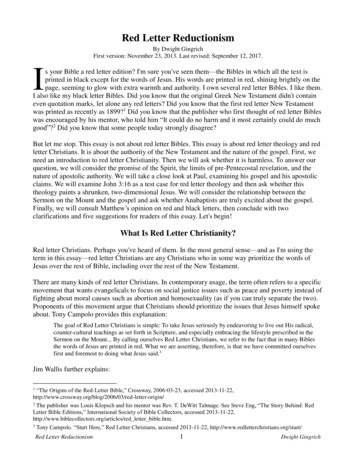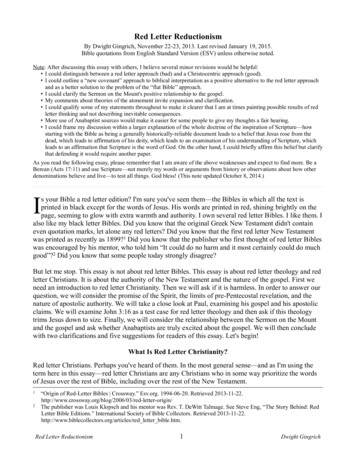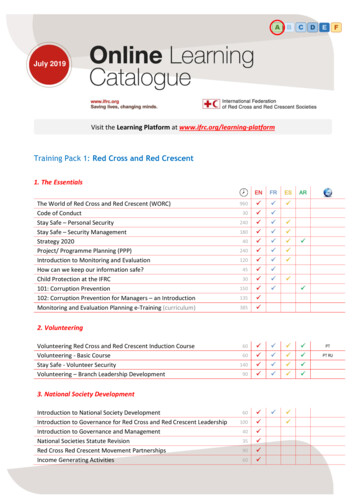
Transcription
Red Letter ReductionismBy Dwight GingrichFirst version: November 23, 2013. Last revised: September 12, 2017.Is your Bible a red letter edition? I'm sure you've seen them—the Bibles in which all the text isprinted in black except for the words of Jesus. His words are printed in red, shining brightly on thepage, seeming to glow with extra warmth and authority. I own several red letter Bibles. I like them.I also like my black letter Bibles. Did you know that the original Greek New Testament didn't containeven quotation marks, let alone any red letters? Did you know that the first red letter New Testamentwas printed as recently as 1899?1 Did you know that the publisher who first thought of red letter Bibleswas encouraged by his mentor, who told him “It could do no harm and it most certainly could do muchgood”?2 Did you know that some people today strongly disagree?But let me stop. This essay is not about red letter Bibles. This essay is about red letter theology and redletter Christians. It is about the authority of the New Testament and the nature of the gospel. First, weneed an introduction to red letter Christianity. Then we will ask whether it is harmless. To answer ourquestion, we will consider the promise of the Spirit, the limits of pre-Pentecostal revelation, and thenature of apostolic authority. We will take a close look at Paul, examining his gospel and his apostolicclaims. We will examine John 3:16 as a test case for red letter theology and then ask whether thistheology paints a shrunken, two-dimensional Jesus. We will consider the relationship between theSermon on the Mount and the gospel and ask whether Anabaptists are truly excited about the gospel.Finally, we will consult Matthew’s opinion on red and black letters, then conclude with twoclarifications and five suggestions for readers of this essay. Let's begin!What Is Red Letter Christianity?Red letter Christians. Perhaps you've heard of them. In the most general sense—and as I'm using theterm in this essay—red letter Christians are any Christians who in some way prioritize the words ofJesus over the rest of Bible, including over the rest of the New Testament.There are many kinds of red letter Christians. In contemporary usage, the term often refers to a specificmovement that wants evangelicals to focus on social justice issues such as peace and poverty instead offighting about moral causes such as abortion and homosexuality (as if you can truly separate the two).Proponents of this movement argue that Christians should prioritize the issues that Jesus himself spokeabout. Tony Campolo provides this explanation:The goal of Red Letter Christians is simple: To take Jesus seriously by endeavoring to live out His radical,counter-cultural teachings as set forth in Scripture, and especially embracing the lifestyle prescribed in theSermon on the Mount. By calling ourselves Red Letter Christians, we refer to the fact that in many Biblesthe words of Jesus are printed in red. What we are asserting, therefore, is that we have committed ourselvesfirst and foremost to doing what Jesus said.3Jim Wallis further explains:“The Origins of the Red-Letter Bible,” Crossway, 2006-03-23, accessed d-letter-origin/2The publisher was Louis Klopsch and his mentor was Rev. T. DeWitt Talmage. See Steve Eng, “The Story Behind: RedLetter Bible Editions,” International Society of Bible Collectors, accessed /red letter bible.htm.3Tony Campolo. “Start Here,” Red Letter Christians, accessed 2013-11-22, http://www.redletterchristians.org/start/1Red Letter Reductionism1Dwight Gingrich
We affirm the authority of the whole Bible, not just the explicit sayings of Jesus But we believe that the“red letters” of Jesus need to be focused on again.4Certainly, American Christianity needs to pay closer attention to Jesus’ words. But despite their claimto affirm the authority of the whole Bible, Campolo and Wallis have tended to downplay biblicalteachings not explicitly addressed by Jesus. This has been proven over time by how they have adoptedtheologically liberal positions on matters such as homosexuality. Thus they share some similarities withclassic liberal theologians, who have often found Paul rather distasteful thanks to his “narrow” viewsabout such matters as gender roles and his insistence on doctrinal precision. Some have even insistedthat Paul and his supporters misinterpreted Jesus, turning his Jewish renewal movement into a newreligion called Christianity, complete with hierarchical leadership structures.But there is also a conservative kind of red letter Christianity—indeed, an Anabaptist kind—and that isthe focus of this essay. These conservative red letter Christians are not a cohesive movement. They arenot all alike. But if you listen long enough, here are some things you will sometimes hear. Mostobviously, like Campolo and Wallis, they will emphasize the Sermon on the Mount. Like them, theywish to distance themselves from traditional evangelical doctrinal camps and lifestyles. In contrast,they will probably aim to carefully teach all the ethical commands found throughout the entire NewTestament. And unlike classic Protestant liberals, they may insist that Jesus and Paul agree. In fact, theymay insist that Jesus and Paul not only agree, but—what is more—that they teach the same thing. Inactual practice, however, these Christians typically define this “same thing” using the words of Jesus,not Paul. They are much happier to use Jesus' language of discipleship than Paul's language ofjustification by faith. Some insist that emphasis on the latter—or at least on the traditional Protestantdoctrine of “faith alone”—has resulted in nominal Christians who think they can pray the “sinner'sprayer,” be “born again,” and sin their way securely to heaven. “Believe on the Lord Jesus Christ, andthou shalt be saved” (Acts 16: 31 KJV) seems just a little too easy. For similar reasons, John 3:16 is notusually a favorite verse of these Christians. These Christians are most at home when reading the firstthree Gospels, particularly Matthew.These conservative red letter Christians are often suspicious of theology. They diligently mine theentire New Testament for ethical commands, but tend to spend little time on the theological chapters,such as Ephesians 1-3. Romans 12 (“be not conformed,” KJV) is a welcome friend, but Romans 1-11are seldom explained with care and deep understanding. They often warn against “quarrels aboutwords” (1 Timothy 6:45) but are less likely hold up Paul's example of “reasoning and persuading.about the kingdom of God” (Acts 19:8) or his admonition that elders must “be able to give instructionin sound doctrine and also to rebuke those who contradict it” (Titus 1:9). Sometimes you get the sensethat these Christians think that what you believe—theology—is less important than what you do—ethics. Don't be a theologian; rather, be a disciple.Thus, red letter Christians believe that the most important parts of the Bible are those that directlyrecord the example and teachings of Jesus. The ancient creeds and many evangelicals today emphasizethe beginning and end of Jesus' life—the incarnation and the atonement; Jesus is primarily our Savior.In contrast, many liberal theologians doubt the incarnation and the atonement, focusing only on themiddle of Jesus' life; Jesus is reduced to a great Teacher and Social Liberator. Conservative red letterChristians mention Jesus' role as Savior, but emphasize his role as Teacher and Example. The primarycommand is not “believe” but “follow.”Jim Wallis, “Forward,” Red Letter Christians: A Citizen’s Guide to Faith and Politics, Tony Campolo. (Ventura, CA:Regal, 2008), 10-11.5Unless otherwise noted, Bible quotations are from the English Standard Version.4Red Letter Reductionism2Dwight Gingrich
Conservative red letter Christians read the entire Bible through the lens of the life and teachings ofJesus as found in the Gospels. How can one correctly interpret the Bible? By beginning and endingwith Jesus. Use his actions to interpret his words, and use his words to interpret his actions. Use both tointerpret every other biblical text. In particular, be sure every interpretation harmonizes with theSermon on the Mount. This is the “Constitution of the Kingdom of God.” Indeed, the Sermon on theMount, they may say, reveals the very heart and essence of Christianity, just as Jesus himself revealsthe very nature of God.Is Red Letter Christianity Harmless?What should we make of this conservative red letter Christianity? Clearly, there is much good toaffirm—especially the emphasis on living as fully devoted disciples of Christ. Red letter disciples willhelp you spot the idols in your own heart. They will alert you to heavenly rewards. They make youeager to live in such a way that God's kingdom comes and his will is done on earth as it is in heaven.But can we confidently say that this red letter Christianity “could do no harm”?The promise of the Spirit and the glory of Jesus: “I still have many things to say to you”Perhaps the best place to begin our answer is with some red letters from the Gospel of John. Here's thescene: It is the final evening before Jesus' crucifixion. He is spending it alone with his closest disciples.No one else is present. Even Judas has left. In this intimate setting, Jesus tells the eleven, “No longer doI call you servants, for the servant does not know what his master is doing; but I have called youfriends, for all that I have heard from my Father I have made known to you” (John 15:15). Reread thatlast clause: “All that I have heard from my Father I have made known to you.” Can you imagine astronger endorsement for red letter Christianity? After all, do we need to know more than Jesus knows?If we rewind the audio from this final evening a little, we hear this: “These things I have spoken to youwhile I am with you. But the Helper, the Holy Spirit, whom the Father will send in my name, he willteach you all things and bring to your remembrance all that I have said to you” (John 14:25-26). Noticefirst the promise of the Holy Spirit; something—no, Somebody—is coming. He is coming in Jesus'name—delegated as Christ's authoritative representative. What will he do? He will “bring to yourremembrance all that I have said to you.” What does this mean? Among other things, surely it meansthat the four Gospels we hold today were written under the guidance of the Holy Spirit; they areaccurate records of what Jesus said. So again, it seems we can rest easy as red letter Christians.But we skipped a clause: “He will teach you all things.” What does this mean?If we fast-forward the audio toward the end of the evening, we hear this:I still have many things to say to you, but you cannot bear them now. When the Spirit of truth comes, he willguide you into all the truth, for he will not speak on his own authority, but whatever he hears he will speak,and he will declare to you the things that are to come. He will glorify me, for he will take what is mine anddeclare it to you. (John 16:12-14)“Many things”! Do you feel the force of these words? Jesus still had many things to say to his disciples,but he was unable to say them, because they were unable to bear them. What a tragedy! What a loss! Ifonly the disciples had been mature enough to receive all Jesus' words! Doesn't this make you want tocrawl back through time and shake the disciples—knock some spiritual sense into their dull heads?Because of their weakness, we will never know everything Jesus wished to tell us. Right?Red Letter Reductionism3Dwight Gingrich
But wait. Again we have a promise of the Spirit. “He will guide you into all the truth.” What does thismean? When were the apostles guided by the Spirit into all the truth? What truths were they givenunder the Spirit's inspiration? What did the Spirit take that belonged to Jesus (“he will take what ismine”) and deliver with the full authority of Jesus (“he will not speak on his own authority”) to theapostles? Where can we find those Spirit-borne, apostle-received teachings of Jesus today? Surely wefind them in the writings of the New Testament—in the sermons of Acts, in the epistles, and inRevelation. And surely we find them even in the “editorial comments” and explanations included in theblack words of the four Gospels. Here, at least in part, are the “many things” Jesus wanted his disciplesto know.Note carefully: the truth that the Spirit would speak to the apostles would be grounded on the sameauthority as the words spoken by Jesus while he was on earth. “He will not speak on his ownauthority.” Just as Jesus told his disciples “all that [he had] heard from [his] Father,” so the Spirit wouldspeak “whatever he hears” from Jesus. Why would we say that some of Jesus' words (in the Spiritinspired apostolic writings) are not as authoritative as others (those he spoke in the flesh)?Note also: “He will glorify me”; the result of the Spirit's teaching would be the glorification of Christ.Why, then, would we want to demote the black letter portions of Scripture? Why risk detracting fromthe full glory of Christ?Here we must pause to examine what we mean by “the authority of Scripture.” First, following N.T.Wright, I believe that “the phrase ‘the authority of scripture’ can make Christian sense only if it isshorthand for ‘the authority of the triune God, exercised somehow through scripture.’”6 On the onehand, this definition prevents us from directing worship to a book rather than to its Author; on the otherhand, it reminds us that reverence for Scripture as the word of God is not idolatry but essential fear ofGod. Second, the term authority is used variously to refer to both (a) the divine origin of Scripture and(b) the weight or influence that any portion of Scripture carries to shape our interpretations andbehaviors. In this essay I am primarily addressing the question of the divine origin of Scripture, arguingthat red and black letters alike are words from God and, in that sense, equally authoritative. But onequestion leads to another; those who question whether all black letters truly come from God will alsonot allow them to shape their interpretations and behaviors as strongly. So near the end of this essay Iwill briefly address the question of which passages of Scripture should rightly shape our interpretationof Scripture most directly and strongly.Back to Jesus’ words in John: True, all our Scriptural interpretations must harmonize with Jesus' lifeand teachings. And true, some words of Scripture carry more interpretive weight (more on this later).Yet, if we believe with Paul and Peter that all Scripture is given by inspiration of God (2 Tim 3:16; 1Pet. 1:21; 2 Pet. 3:15-16), then this passage from John suggests that all the words of Scripture—including those written by the apostles—are equally authoritative in the sense of being equally theword of God. To deny this hardly squares with Jesus' claim that the Spirit's words bear the sameauthority as his own earthly words—that the Spirit's words come from the Father and from Christhimself.True, Jesus' earthly life and teachings are central to Scriptural revelation. True, we are no longer underthe old covenant. But, central though they are, Jesus’ life and teachings are hardly the climax ofScriptural revelation. Jesus’ death and resurrection more properly bear that title, for they are theultimate turning point in the history of creation, the moment of crisis upon which all eternity hangs.6N.T. Wright, Scripture and the Authority of God: How to Read the Bible Today (New York: Harper One, 2011), 21.Red Letter Reductionism4Dwight Gingrich
And even Jesus’ death and resurrection are not the denouement where all the loose ends of creation arefinally resolved; that awaits Christ’s promised return in glory.The limits of pre-Pentecostal revelation: “Are you also without understanding?”If Jesus still had “many thing” he wanted to say to his disciples, why didn’t he say them before he died?As a partial answer, consider the blindness of the disciples during Jesus' earthly ministry. For example,let's survey just four chapters: Mark 6 through 9. After Jesus fed the five thousand, the disciples were“utterly astounded” to see him walk on the water and calm the sea; “for they did not understand aboutthe loaves, but their hearts were hardened” (6:51-52). When the disciples asked Jesus to explain aparable, he said, “Then are you also without understanding? Do you not see.?” (7:18). When theymisunderstood Jesus' word picture about the leaven of the Pharisees, he seemed positively frustratedwith them: “Do you not yet perceive or understand? Are your hearts hardened? Having eyes do you notsee, and having ears do you not hear? And do you not remember? When I broke the five loaves for thefive thousand, how many baskets full of broken pieces did you take up?. And the seven for the fourthousand, how many baskets full of broken pieces did you take up?. Do you not yet understand?”(8:17-21). After Jesus taught the disciples about his coming death and resurrection (“and he said thisplainly”), Peter rebuked Jesus, earning another rebuke: “Get behind me, Satan!” Despite Peter's earlierproclamation that Jesus is the Christ, he was still extremely confused about who the Christ would be(8:32). A few days later, on the mount of transfiguration, Peter suggested they honor Moses and Elijahas equals with Jesus, “for he did not know what to say” (9:6). Many similar examples could be addedfrom other passages.Given how blind the disciples were, we should not be surprised that there were “many things” thatJesus was unable to say. The disciples seemed unable to accept even the bare physical facts about Jesus'coming death and resurrection. It is no wonder that Jesus never tried to give them a full theologicalexplanation of the atonement! Thus, to argue against penal substitutionary atonement on the basis thatyou can't find it in Jesus' own teachings7 is to misunderstand the flow of redemptive history. It ismaking the same sort of interpretive error as those who claim that Jesus wasn't divine just because theydon't think Jesus ever explicitly said so himself.It took time for the disciples to understand the theological implications of Jesus' ministry, death, andresurrection. For example, when Jesus rode into Jerusalem on a donkey, “his disciples did notunderstand these things at first, but when Jesus was glorified, then they remembered that these thingshad been written about him and had been done to him” (John 12:16). Notice five things: First, noticethat the disciples did not understand Jesus' actions until after Jesus' death and resurrection (when he“was glorified”). Second, notice that they did not understand the Old Testament or its relationship toJesus until after that time, either. This means, third, that Jesus' death and resurrection were an essentialturning point that made understanding possible. Fourth, notice that the Old Testament served as the lensthat explained the significance of Jesus' actions—the Old Testament! Not the words of Jesus alone oreven merely the rest of the New Testament (which the apostles themselves were to write later). Fifth,notice that John does not clearly explain in this immediate context what it was that the discipleseventually understood about Jesus' actions. John does briefly explain some of this understanding atother points in his Gospel (see John 1:1-14 and 20:30-31), but he leaves many theological truthscryptically encoded.7A strong argument can be made that it is there in seed form. See, for example, Matt. 20:28; 27:46, or John 3:14-15 incontext of vv. 16-18, 36.Red Letter Reductionism5Dwight Gingrich
If we compare John with the other three Gospels, we find that the others contain even less explicittheological explanation. Indeed, if we possessed only the first three Gospels, it is doubtful if many of uswould understand much at all about Christ's saving work. None of the resurrection accounts, forinstance, say anything like “Jesus rose from the grave and therefore we can be sure that we, too, will begiven resurrection bodies.” Yet this truth is emphasized many times later in the New Testament as afocal point of Christian hope. It is only as we look back at the four Gospels with the insights providedby the rest of the New Testament (and the Old Testament!) that we can understand something of the fullsignificance of Jesus' words and actions.Try making a list sometime of all the New Testament truths that are not found in red letters. You mightbe surprised at the length of the list. There are “many things” that Jesus’ disciples were simplyunprepared to receive prior to the cross, resurrection, and Pentecost. So Jesus saved words for later.Apostolic authority: “As the Father has sent me, even so I am sending you”There is much additional New Testament evidence that Christ had authoritative teaching to transmit tohis church even after he ascended. Let's examine some non-Pauline passages first.A good place to continue is with three observations from the author Luke. First, we should considerwhat Luke's Gospel tells us about Jesus' own words. Luke's introduction to his Gospel reminds us ofhow the four Gospels were composed (see Luke 1:1-4). For example, it reminds us that the Gospels arecompilations of narratives; thus, the Gospel writers were selective in what they included. The Gospelsare based on what “eyewitnesses and ministers of the word” delivered; thus, they are based on oralaccounts (and probably written portions) that existed before the Gospel writers crafted the Gospels weknow today. Thus the Gospels were composed in what appeared outwardly to be a rather ordinaryhuman manner. Those of us who agree that they are part of God-breathed Scripture must conclude thatthe Holy Spirit oversaw both the memories of the eyewitnesses and compilation choices of the Gospelwriters.In addition, most historians of first-century Israel agree that Jesus did not teach primarily in Greek, thelanguage in which our Gospels were written, but in Aramaic. Thus it is not stretching the facts to saythat we possess almost none of the actual words that Jesus' spoke. (I say “almost none” because of thefew Aramaic phrases included within the Greek New Testament.) Rather, we possess inspiredtranslations that accurately convey the true message of Jesus' own words.8These facts about memory, compilation, and translation reduce the distinction we can make betweenJesus' own words and the words of the rest of the New Testament. Both come to us through the Spiritguided apostolic witness.Second, the ending of Luke's Gospel leaves us longing for more teaching from Jesus. In Luke 24 weread that the risen Jesus “opened [the disciples'] minds to understand the Scriptures” in an entirely newway and that he “interpreted to them in all the Scriptures the things concerning himself” (Luke 24:27,45). The first readers of Luke (and keen ones today), however, are apparently left hanging. Where arethe interpretations that Jesus provided? Are we left unable to understand the Old Testament, unable to8In addition, every translation involves interpretation. This is evident in the Gospels, for there are many times were thevarious Gospel writers use different Greek words while translating the very same conversation of Jesus! Every sentence thatwe speak carries a cluster of explicit meanings and implicit connotations. Each of the Gospel writers was inspired tofaithfully emphasize unique aspects of the meanings and connotations of Jesus' words as they translated them. A similar(though more fallible) process today explains much of the variation between our English Bible translations.Red Letter Reductionism6Dwight Gingrich
understand Christ and his work well enough to proclaim him to the nations? The first readers of Luke,however, were not truly left hanging, and nor are we. Luke wrote a sequel to his Gospel—the book ofActs. In this book we find many apostolic sermons, and most of these are filled with quotations fromthe Old Testament. I suggest that in these sermons we can discover some of what Jesus explained to thedisciples in Luke 24. Again, we do not have Jesus' actual words, but we do have his message,transmitted through the apostolic witness.Luke opens his sequel with a telling clause: “In the first book, O Theophilus, I have dealt with all thatJesus began to do and teach” (Acts 1:1). Notice the word “began.” While the translation andinterpretation of this clause is debated,9 the word “began” may suggest that Jesus was not done “doing”and “teaching” when he ascended. This interpretation is supported by several passages later in Acts. Inhis Pentecostal sermon, Peter says that it was the exalted Jesus who initiated the miraculous events ofthat day: “He [Jesus] has poured out this that you yourselves are seeing and hearing” (Acts 2:33). Laterin the book, at another crucial juncture (the expansion of “the word” into Europe), we find that Jesus isstill active. When Paul and his companions attempted to go into Bithynia, “the Spirit of Jesus did notallow them” (Acts 16:7; see Phil. 1:19). These textual clues remind us that we cannot limit our focus tothe Gospels if we want to discover all that Jesus has done and taught. Even after Pentecost, it tookyears for the Spirit of Jesus to teach the apostles many truths, such as the inclusion of the Gentiles inhis kingdom.Third, as the ending of Luke and the beginning of Acts link those two books together (more links couldbe explored), so the book of Acts as a whole links the Gospels to the rest of the New Testament. Whoare the main human characters in Acts—those Spirit-filled men who carried the gospel of Jesus fromJerusalem to the ends of the earth? Who are the authors of the rest of the New Testament—those Spiritfilled men who wrote letters to guide Jesus' church? The answers to our two questions are nearlyidentical. Peter and Paul are the main human characters of Acts, supported by, among others, John andJames. And it was these four men, supported by one or two others, who wrote the rest of the NewTestament. Thus the book of Acts points us forward, affirming the apostolic authority of the epistles.Apostolic authority is a concept crucial to our understanding of the authority of the New Testamentdocuments. Paul writes that the church of Christ is “built on the foundation of the apostles andprophets”—those who were specially chosen to have the mystery of Christ revealed to them by theSpirit (Eph. 2:20; cf. 3:4-5). The first traces of this authority are found in the Gospels themselves, asJesus appoints twelve “whom he also named apostles” (Mark 3:14).10 Before his ascension hecommissions them as his authoritative witnesses. Consider again his words: “All authority in heavenand on earth has been given to me. Go therefore and make disciples of all nations. And behold, I amwith you always, to the end of the age” (Matt 28:18-20). “Thus it is written, that the Christ shouldsuffer and on the third day rise from the dead, and that repentance and forgiveness of sins should beproclaimed in his name to all nations, beginning from Jerusalem. You are witnesses of these things”(Luke 24:47-48). “You will receive power when the Holy Spirit has come upon you, and you will bemy witnesses” (Acts 1:8). “As the Father has sent me, even so I am sending you” (John 20:21).Christians through the ages have rightly perceived that these “Great Commission” passages carryimplications for Christians throughout all ages, until the work of witnessing to the nations has been9For example, commentators F. F. Bruce, Charles K. Barrett, I. Howard Marshall, and David Peterson agree with theinterpretation I am presenting, while Ben Witherington III and some others do not.10I also understand Jesus' statement to Peter (“on this rock I will build my church” Matt. 16:18) to refer to the unique rolethat Peter was given during the founding of the church, as recorded in the first half of Acts, but I will not try to defend thatview here.Red Letter Reductionism7Dwight Gingrich
completed. However, we should also recognize that the first apostles were given a unique andfoundational role in this task. To this day (and “to the end of the age”), it is the written witness of theapostles that we carry to the nations, not merely our own words or our own experiences of Christ.It is instructive to study the use of the word witness in the book of Acts. At the end of the first chapterwe find the eleven apostles concerned that someone must be chosen to replace Judas. But not justanyone will do. It must be “one of the men who have accompanied us during all the time that the LordJesus went in and out among us, beginning from the baptism of John until the day when he was takenup from us”—only such a person can serve as “a witness to [Jesus'] resurrection” (Acts 1:21-22). Inother words, a “witness” must be an eye-witness—someone who, through prolonged exposure, had seenJesus with his physical eyes. In addition, note the sense of a specific role or office to fill: “one of thesemen must become with us a witness” (Acts 1:22, emphasis added; cf. Luke 24:48). These words suggestthat a witness was not simply one who had seen, but also someone appointed to give witness, someoneappointed to join a defined group of witnesses. This is different from our use of the word witness todaywhen we speak of being a “witness” for Jesus.The rest of Acts underscores this specialized use of the word witness. Peter tells Cornelius that God“made [the risen Jesus] to appear, not to all the people but to us who had been chosen by God aswitnesses, who ate and drank with him after he rose from the dead. And he commanded us to preach tothe people and to testify.” (Acts 10:40-42, emphasis added; cf. 13:31). This is why it is crucial thatPaul, too, should see the risen Christ. Only after seeing can
What Is Red Letter Christianity? Red letter Christians. Perhaps you've heard of them. In the most general sense—and as I'm using the term in this essay—red letter Christians are any Christians who in some way prioritize the words of Jesus over the rest of Bible, including over the rest of the New Testament.










